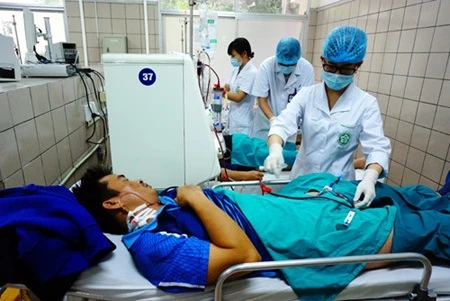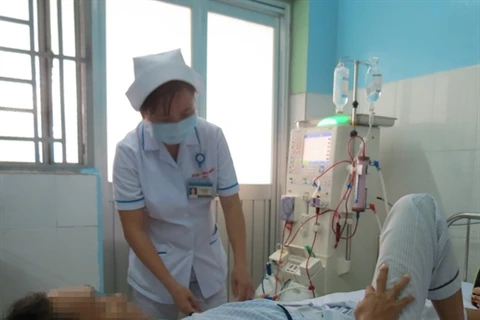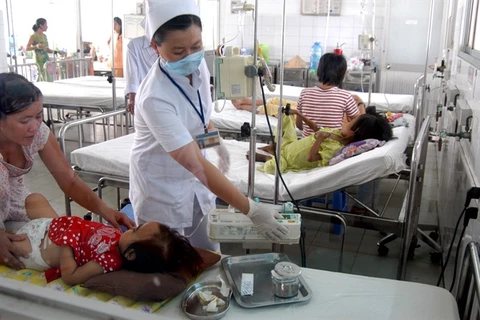HCM City (VNA) - More than 26,000 people receive regular dialysis treatment in the country, which helps prolong their life.
A 42-year-old patient in HCM City’s District 8 with end-stage kidney failure for three years has visited An Binh Hospital weekly for dialysis, which removes waste, salt and extra water from his blood to prevent them from building up in the body. Dialysis also helps control blood pressure.
Dr Vo Duc Chien, Director of Nguyen Tri Phuong Hospital in HCM City, said that effective dialysis helps prolong the life of patients with the condition.
The hospital has the only advanced dialysis machines in HCM City, which use high-flux membrane (with larger pore size) dialyzers which filter the blood of patients. These are considered by some doctors to be more effective than low-flux dialyzers.
Chien said that many patients at end-stage disease need a kidney transplant, but there are not enough donated kidneys. Those patients must receive dialysis treatment regularly.
Dr Pham Van Bui, Chairman of the Society of Dialysis Therapy of HCM City, said that chronic kidney failure in 2010 was the 18th cause of fatalities globally, compared to the 27th cause of deaths in 1990.
One out of 10 people suffer from the condition worldwide, Bui said, adding that the figure in Vietnam is higher. However, there is no official number of patients with the condition.
Chronic kidney failure cannot be cured, he said, adding that patients diagnosed at the end stage of kidney failure must have dialysis for the rest of their life.
“The leading criterion for dialysis is how to improve quality of living for patients and help them live for an additional 30 years. This can be done with patients who use dialysis in Japan,” Bui said.
He said that it was important for patients to have normal lives and take part in social activities.
To improve efficiency and reduce the death rate, health facilities in the country providing dialysis should use high-flux dialysis and replace low-flux dialysis treatments, he said.
Hirokazu Matsubara of the Japanese Society for Technology of Blood Purification said that patients in Japan lived longer if they used high-flux dialysis, sometimes up to 40 more years.
Matsubara said it was essential to use very pure water to prevent bacterial contamination during treatment.
Filtration membranes in dialysis machines should not be reused to treat another patient, a practice that sometimes occurs in Vietnam, reducing treatment effectiveness, he added.
Bui said that in Vietnam, kidney disease can develop in patients who are obese or diabetic.
A strategy for losing weight and preventing diabetes, high blood pressure and cardiac disease helps reduce the risk for kidney conditions, he added.
“The most important thing is to provide guidance on nutrition for patients,” Bui said.
During dialysis, patients should take vitamins and eat nutritious diets with meals having enough protein, fat and other nutrients to avoid malnutrition and anaemia, he said.
Many patients often become malnourished because they do not obey doctors’ recommendations or do not receive information from doctors about nutritional supplementation, he added.-VNA
A 42-year-old patient in HCM City’s District 8 with end-stage kidney failure for three years has visited An Binh Hospital weekly for dialysis, which removes waste, salt and extra water from his blood to prevent them from building up in the body. Dialysis also helps control blood pressure.
Dr Vo Duc Chien, Director of Nguyen Tri Phuong Hospital in HCM City, said that effective dialysis helps prolong the life of patients with the condition.
The hospital has the only advanced dialysis machines in HCM City, which use high-flux membrane (with larger pore size) dialyzers which filter the blood of patients. These are considered by some doctors to be more effective than low-flux dialyzers.
Chien said that many patients at end-stage disease need a kidney transplant, but there are not enough donated kidneys. Those patients must receive dialysis treatment regularly.
Dr Pham Van Bui, Chairman of the Society of Dialysis Therapy of HCM City, said that chronic kidney failure in 2010 was the 18th cause of fatalities globally, compared to the 27th cause of deaths in 1990.
One out of 10 people suffer from the condition worldwide, Bui said, adding that the figure in Vietnam is higher. However, there is no official number of patients with the condition.
Chronic kidney failure cannot be cured, he said, adding that patients diagnosed at the end stage of kidney failure must have dialysis for the rest of their life.
“The leading criterion for dialysis is how to improve quality of living for patients and help them live for an additional 30 years. This can be done with patients who use dialysis in Japan,” Bui said.
He said that it was important for patients to have normal lives and take part in social activities.
To improve efficiency and reduce the death rate, health facilities in the country providing dialysis should use high-flux dialysis and replace low-flux dialysis treatments, he said.
Hirokazu Matsubara of the Japanese Society for Technology of Blood Purification said that patients in Japan lived longer if they used high-flux dialysis, sometimes up to 40 more years.
Matsubara said it was essential to use very pure water to prevent bacterial contamination during treatment.
Filtration membranes in dialysis machines should not be reused to treat another patient, a practice that sometimes occurs in Vietnam, reducing treatment effectiveness, he added.
Bui said that in Vietnam, kidney disease can develop in patients who are obese or diabetic.
A strategy for losing weight and preventing diabetes, high blood pressure and cardiac disease helps reduce the risk for kidney conditions, he added.
“The most important thing is to provide guidance on nutrition for patients,” Bui said.
During dialysis, patients should take vitamins and eat nutritious diets with meals having enough protein, fat and other nutrients to avoid malnutrition and anaemia, he said.
Many patients often become malnourished because they do not obey doctors’ recommendations or do not receive information from doctors about nutritional supplementation, he added.-VNA
VNA
























